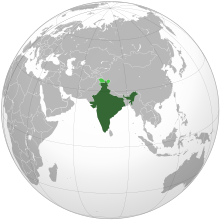LGBTQ rights in India | |
|---|---|
 Area controlled by India shown in dark green; disputed regions shown in light green | |
| Status | Homosexuality legal since 2018 (Navtej Singh Johar v. Union of India) |
| Gender identity | Transgender people have a constitutional right to change their legal gender, and a third gender (non-binary) is recognised.[1][2] (National Legal Services Authority v. Union of India) |
| Military | Openly homosexual people are banned[3] |
| Discrimination protections | Explicit gender identity protections and indirect constitutional protections for sexual orientation (see below) |
| Family rights | |
| Recognition of relationships | Limited cohabitation rights |
| Adoption | Adoption by single LGBT people is recognized, but not by same-sex couples |
| Part of a series on |
| LGBTQ rights |
|---|
 |
| Lesbian ∙ Gay ∙ Bisexual ∙ Transgender ∙ Queer |
|
|
| Part of a series on |
| LGBTQ topics |
|---|
|
|
Lesbian, gay, bisexual, transgender, and queer (LGBTQ) people in India face legal and social challenges not experienced by non-LGBTQ people.[4] There are no legal restrictions against gay sex within India. Same-sex couples have some limited cohabitation rights, colloquially known as live-in relationships.[5][6] However, India does not currently provide for common-law marriage, same-sex marriage, civil union, guardianship, unregistered cohabitation or issue partnership certificates.[7][8][9]
The Transgender Persons (Protection of Rights) Act, 2019 recognizes the right to self-perceived gender identity, and new identification documents confirming the change of gender can be issued by government agencies once a certificate is provided by a relevant medical official.[10] Transgender citizens have a constitutional right to register themselves under a third gender.[11]
Additionally, some states protect hijras, a traditional third gender population in South Asia through housing programmes, and offer welfare benefits, pension schemes, free operations in government hospitals as well as other programmes designed to assist them. There are approximately 480,000 transgender people in India as per Census 2011.[12][13][14]
Since the 2010s, LGBTQ people in India have increasingly gained tolerance and acceptance in society,[15] with a 2023 Pew Research Center poll finding that 53% of Indians supported the legalisation of same-sex marriage, while 43% were opposed.[16] According to a 2024 research, 79% gay men and 44% bisexual men have faced verbal, physical or any other sort of violence. Muslim respondents were 2.6 times more likely to face violence compared to respondents whose religion was Hindu, and respondents who were out about their sexuality in public were five times more likely to face violence than those who were not.[17]
- ^ "Global Human Rights Defence". Ghrd.org. Archived from the original on 13 November 2020. Retrieved 26 January 2021.
- ^ "National Legal Services Authority v. Union of India" (PDF). Archived from the original (PDF) on 27 May 2014. Retrieved 11 July 2014.
- ^ Gurung, Shaurya Karanbir (11 January 2019). "Homosexuality and adultery unacceptable in Army: Bipin Rawat". The Economic Times. ISSN 0013-0389. Retrieved 16 May 2023.
- ^ "LGBTQIA+ and their situation in India". The Times of India. ISSN 0971-8257. Retrieved 1 March 2024.
- ^ Cite error: The named reference
ThePrint2020was invoked but never defined (see the help page). - ^ Pandey, Geeta (16 October 2023). "Same-sex marriage: India awaits historic Supreme Court verdict". BBC News. Retrieved 16 October 2023.
- ^ Mathur, Vaishali (June 2020). "Homosexual Live-in relationship in India: Socio Legal Dimension in reference to Right to life or Social stigma". International Journal of Psychosocial Rehabilitation. 24 (8): 14989–14995. ISSN 1475-7192.
- ^ "Indian High Court Reaffirms Same-sex Couples' Right to Cohabitation". Human Rights Pulse. 9 August 2020. Retrieved 5 January 2024.
- ^ Kelleher, Patrick (18 October 2023). "India's LGBTQ+ community 'must demand' equality, following crushing same-sex marriage blow". PinkNews. Retrieved 18 October 2023.
- ^ "Guide on the Rights of Transgender Persons in India". Nyaaya. Retrieved 16 November 2022.
- ^ Vakoch, Douglas A., ed. (2022). Transgender India: Understanding Third Gender Identities and Experiences. Cham, Switzerland: Springer. doi:10.1007/978-3-030-96386-6. ISBN 978-3-030-96385-9. S2CID 213383859.
- ^ Cite error: The named reference
billwas invoked but never defined (see the help page). - ^ "India: Prosecute Rampant 'Honor' Killings". Human Rights Watch. 18 July 2010.
- ^ Patel, Rashmi (27 August 2016). "Being LGBT in India: Some home truths". Livemint.com.
- ^ "Hundreds of gay rights activists join pride march in Delhi". ABC. 12 November 2017. Archived from the original on 12 November 2017. Retrieved 10 May 2021.
- ^ Sneha, Gubbala; Poushter, Jacob; Huang, Christine (27 November 2023). "How people around the world view same-sex marriage". Pew Research Center. Archived from the original on 23 May 2024. Retrieved 13 June 2024.
- ^ "High prevalence of sexual violence among gay, bisexual men across six cities: study". thehindu.com. Retrieved 11 November 2024.